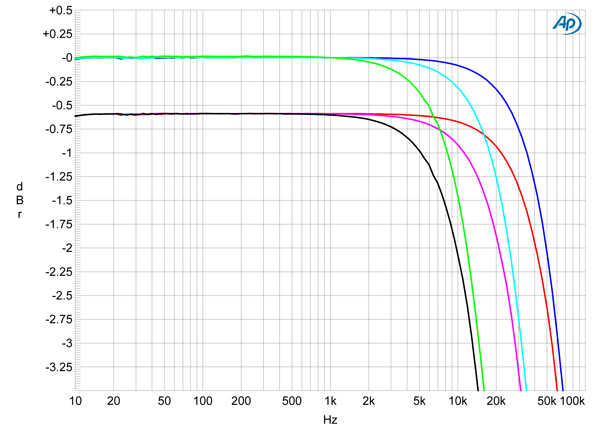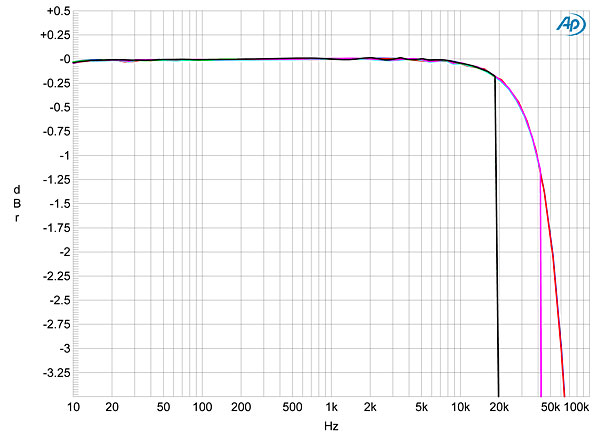In my system I heard the Denafrips Terminator Plus and it was clearly better than the Bryston DAC.
I'm not surprised that the Denafrips sounds different than the Bryston in your system, it's always about synergy.
But you are comparing apples and oranges. The Stereophile review says the Bryston uses dual AKM chips whereas the Denafrips is a R2R NOS (non-oversampling) DAC.
R2R NOS DACs slowly roll off the highs starting earlier than the AKM chip.
The Stereophile Denafrips Terminator measurements are a good example:

Denafrips Terminator, NOS mode, frequency response at –12dBFS into 100k ohms with data sampled at: 44.1kHz (left channel green, right gray), 96kHz (left cyan, right magenta), and 192kHz (left blue, right red) (0.5dB/vertical div.).
The Stereophile Bryston BDA-3 measurements show an extended high frequency response with the 44.1kHz brick wall filter

Bryston BDA-3, frequency response at –12dBFS into 100k ohms with data sampled at: 44.1kHz (left channel green, right gray), 96kHz (left cyan, right magenta), 192kHz (left blue, right red), 384kHz (left green, right gray) (0.5dB/vertical div.).
The measurements by Golden Sound raise doubt that the Denafrips Terminator Plus is even a NOS DAC, his analysis concludes the Denafrips does linear interpolation oversampling, that doesn't mean it doesn't sound great, it just isn't a true NOS DAC.
https://goldensound.audio/2021/10/07/denafrips-terminator-plus-with-gaia-measurements/Another reason for the difference in sound is how the digital signal is filtered. Different filter choices change how a DAC sounds.
JA's Bryston BDA-3 measurements state:
"The impulse response with data sampled at 44.1kHz (fig.1) revealed that the digital reconstruction filter used by LG was a minimum-phase type, with all ringing occurring after the single sample at 0dBFS."
Sound Stage measured the Denafrips Terminator Plus and found "the NOS mode also yielded a symmetrical impulse response, but with less pre- and post-ringing effects. Of note here is that this is not the shape of NOS DAC impulse response (it should be a square), but that of a typical sinc filter."
In oversampling mode the Denafrips has a Sharp and Slow filter which have more pre- and post-ringing effects than the NOS filter.
https://www.soundstagenetwork.com/index.php?option=com_content&view=article&id=2612:denafrips-terminator-plus-digital-to-analog-converter-measurements&catid=434&Itemid=577I completely eliminated the "which DAC sounds best" quandary by buying a true NOS DAC and using HQPlayer to upsample PCM to DSD256. Why DSD? The simplest answer is it just sounds better. The Bryston does DSD so it is easy to prove it to yourself, don't believe me, believe your ears.
Start with the HQPlayer poly-sinc-gauss-long filter and ASDM7EC-light to upsample to DSD256. The combo has been optimized for all types of music. The learning curve can be steep, the
Audiophile Style HQPlayer thread is dauntingly long but the rewards are worth it. Hint: instead of reading the entire thread, read the last 5 pages and plug in the filters everyone else is using as a starter. You may never need to change.
Other filters can closely approximate other manufacturer's DAC sound characteristics.
[Chord DAC] "Chord-style filters sinc-L group and sinc-short/medium/long the length also affects stop-band attenuation."
[In the latest HQPlayer 5.2.0] "...find new linear phase halfband filters.
"I found the xs one to be very interesting. IMO it shows some similarity to xtr-short."
Miska (HQPlayer's developer) replied:
"It is something I actually made because someone asked what would be closest to Mola-Mola filter, and there weren't any. So this one fairly closely matches the one used by Mola-Mola. And it is very similar to most DAC chip filters (ESS etc) in terms of response as well. Relatively slow roll-off and fairly low attenuation.
https://www.audiocircle.com/index.php?topic=179643.msg1963005#msg1963005Interesting stuff but most audiophiles would rather buy a new DAC every couple of years to get a new sound. When I talk about HQPlayer and it's 165 filters, dithers, noise shapers, and Delta-Sigma (DSD) converters to the guys in our audio club I can watch their eyes roll.